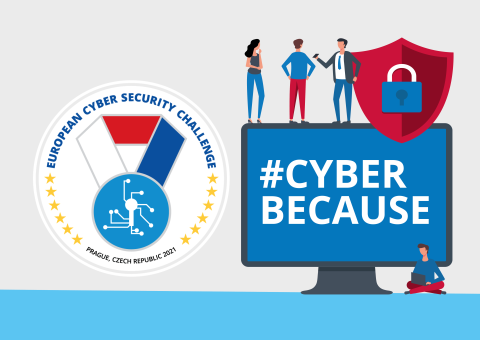The European Cyber Security Challenge (ECSC) is a major European competition held annually in one of the EU countries and as such is a key activity of the European Union Agency for Cybersecurity (ENISA).
This year's ECSC will be held in Prague for the first time since its inception and will take place from 28 September until 1 October 2021. The competition will be attended by 200 competing national teams players under the age of 25, winners of national cybersecurity competitions from the individual European countries and Canada. The teams will test their strengths in penetration testing, cryptography, reverse engineering, forensic analysis, and other challenging tasks.
The ECSC is not just a competition, the aim of this annual activity is to actively address the global problem of the lack of IT professionals and cybersecurity in general. The competition aims to motivate young people to work in IT and to popularise the issue of cybersecurity. The month of October is the European Cybersecurity Month that aims to advance awareness of cybersecurity and build trust in online services.
#CyberBecause
Today, we launch the #CyberBecause campaign to promote the cybersecurity careers and provide role models for young people. There is more to cybersecurity than simply hacking – and what’s more, anyone can forge a career in cybersecurity, no matter what their background is.
The number of cybersecurity professionals needs to grow by 89% globally just to meet current demand. Yet careers in cybersecurity are far more diverse than many people think. A cybersecurity career can take you down many paths, whether your experience lies in IT, engineering, finance, law, communications, policy and much much more. Using the #CyberBecause hashtag, we encourage all cybersecurity professionals to share their story of how they started their career and education.
ECSC 2021
This year, the organisation of competition tasks was prepared by the winning team of the national competition of the Czech Republic, in cooperation with professionals from the Czech Republic and ENISA. The set-up of the entire competition as a sci-fi story taking place in the distant future where the competitors in a role of cyber experts need to defend the space colonisation expedition from hacker attacks. The introductory short story was written for ECSC 2021 by the Czech science fiction writer Jan Kotouč, the author of novels from the science fiction genre and alternative history.
The European Finals in Prague will be sponsored by the Czech Ministry of Defence, Ministry of Foreign Affairs, Ministry of Labour and Social Affairs and the Ministry of Education. Mario Campolargo, Director General of DG Informatics (DIGIT) at the European Commission will present the awards to the winning teams.
Without the support and help of all partners, it would not be possible to carry out such an extensive and significant activity.
Further Information
- On 29 September, a press conference will be held in Prague to provide further information on the European Cybersecurity Challenge.
- During the Challenge, a conference will also take place on the topic of ‘Does the human brain stand a chance?’
- For more information about the competition, please visit the web pages www.ecsc.eu and www.ecsc2021.cz
- For more information on the #CyberBecause and to explore our community stories, check out https://ecsc.eu/about/cyberbecause
Contacts
Erika Pupišová as the ECSC 2021 main coordinator M: 731 475 547 | E: erika.pupisova@ecsc2021.cz
Adrian Belmonte as the ENISA coordinator for the ECSC M: +306985173256| E: adrian.belmonte@enisa.europa.eu
